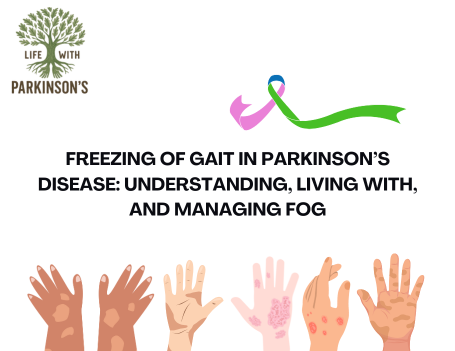Living with Parkinson’s disease means navigating an endless stream of information, advice, and hopeful promises. Over the years, I’ve tried to stay transparent about what I’ve personally experienced — the good, the bad, and the lessons learned along the way. This blog is an honest follow-up to my earlier post about supplements and vitamin B1 therapy.
I want to be clear from the start: I’m not a doctor, and this is not medical advice. I’m simply sharing what has and hasn’t worked for me, in hopes that it might help others make more informed choices.
Searching for a “Silver Bullet”
If you’re living with Parkinson’s, you’ve probably felt the same frustration I have. You want a quick fix — something to knock Parkinson’s out of the park. I’ve been there too. Every time I hear about a promising new therapy, I want it to be the answer.
But the truth is, despite years of trying, I haven’t found that “killer solution” yet. From time to time, I come across something that seems to help my symptoms — something measurable, not just placebo or “good days vs. bad days” — but nothing has been a game-changer.
That’s why I hesitated to write this update. I wanted to come back with better news.
My Experience With High-Dose Vitamin B1 Therapy
For about two to three months, I really gave the high-dose thiamine (vitamin B1) HCL therapy a serious try. I slowly built up my dosages, moving into the higher ranges that people online had been recommending. I don’t know exactly why it didn’t work for me — maybe I didn’t take it long enough, maybe I didn’t use the right product, maybe I wasn’t consistent enough, or maybe something else I was taking interfered with it. All I know is that, despite my hopes, it just didn’t work.
Honestly, I almost feel like I should apologize for saying that. What I can say is that the B1 seemed to get in the way of my other supplements. I had to cut some of the ones that were helping me a little bit just to make room for it. And when I did that, my anxiety just went up, up, up. It became so bad that I finally had to stop taking the B1 altogether.
That doesn’t mean it won’t work for someone else. There are people who have reported benefits from high-dose B1 therapy, and there’s even a community where people share their experiences and research on it. If you’re curious about this therapy, it may be worth looking into further for yourself.
Why I’m Careful About “Miracle” Solutions
Since posting my supplements video on my YouTube channel, I’ve had a huge response from people — comments pouring in all the time with ideas, tips, and suggestions. Honestly, I think that’s fantastic. I’ve been able to interact with people I might never have met otherwise, and I’m so grateful for that.
People write, “Try this. Look into this. Have you seen this?” And I love those comments. Please keep them coming. I’m interested in anything that might help with Parkinson’s. If I ever find something that actually works — something I can measure, something that’s proven — I will absolutely pass it on.
And just so you know, when someone shares a suggestion, I really do look into it. I don’t just do a five-minute Google search. I go deeper. I check through groups like the Parkinson’s
Research Interest Group on Facebook. I search their history. I read through the discussions. I look for the references. When someone mentioned an amazing antioxidant not long ago, I went through the group’s posts, found a scholarly reference, and read it. It took me a couple of days, but that’s what I do.
The truth is, I’ve learned to slow myself down. When you’re living with something like Parkinson’s, it’s easy to get desperate for relief and jump at anything new. I have to tell myself, “Dave, slow down. Check this out before you pass it on.” I don’t want to be the person pressing the big red button saying, “This is it!” when it’s not.
I’ve seen firsthand how vulnerable we can be. A few years ago, a customer at work — a really nice guy at first — struck up a conversation with me. He knew something was wrong, and I told him I had Parkinson’s. A week later, he showed up trying to sell me medical patches. He told me, “We’ve got to get rid of the inflammation first and then Parkinson’s will go away.” It was one of those “crazy person says what?” moments. I don’t even remember what they cost, but when I said I couldn’t afford it, he replied, “Oh, you don’t want to make yourself better?”
That stuck with me. It was a powerful reminder that there are people who will take advantage of our situation. That’s why I keep telling myself — and all of you — to be careful. Be careful about who you let in. Be careful with the information you’re given. Check the history. Check the facts. Protect yourself.
The Financial Reality of Supplements
Another hard truth about supplements is the cost. With inflation, the price of everything — even my main medications — has skyrocketed. Some of my prescriptions have gone up 150% in just a few years. That forces me to make tough decisions: do I cut back on supplements that seem to help, or cut back on medications I need?
For example, melatonin helps me sleep. Creatine helps my muscles recover after exercise. CoQ10 has eased some heart discomfort related to a murmur. These supplements help with symptoms, but they don’t “defeat” Parkinson’s. It keeps marching on in the background.
Everyone’s finances are different, but for me, my pocketbook only stretches so far. When things get tight, I have to decide what stays and what goes.
Talking to Your Doctor about Supplements
One of the smartest things I’ve done is share my supplement list with my doctor. A few years ago, I showed him my magnesium intake. He warned me that too much could affect my heart. I cut back — and later discovered I had a congenital heart murmur. I’m grateful he spoke up.
Now I take less than the maximum daily dose, which helps with my restless legs at night but stays within a safer range for my heart. It’s a good reminder: even “natural” supplements can have real effects. Always talk to your doctor before starting or changing anything.
Finding What Works for You
Here’s the bottom line: everyone’s Parkinson’s journey is different. What works for me might not work for you. What helps you might do nothing for me. Our metabolisms, symptoms, and reactions vary widely.
I haven’t found the perfect set of supplements, but I’ve found a combination that makes some of my symptoms more manageable. And I’ll keep trying new things — carefully — and sharing what I learn.
If you’re trying high-dose B1 therapy, or any other supplement, I’d love to hear about your experience in the comments. We can learn from each other.
Support My Journey
If you’ve found value in my writing or videos, I’d be honored if you’d consider supporting me on Ko-fi. Every contribution — no matter the size — helps me keep this blog going, cover research costs, interview experts, and continue sharing my journey openly and honestly. It also allows me to create more free content and respond to the many comments and messages I receive from people in the Parkinson’s community. If you’d like to be part of this work, click here to support me on Ko-fi and help me keep the conversation going.
A Note from Me
I write these posts not as an expert or authority, but as someone living with Parkinson’s every single day. My goal is to be honest, transparent, and hopeful — even when the news isn’t what I wanted it to be. Some days I’m encouraged, other days are harder, but sharing this journey helps me process it all. If you’re reading this, I hope you’ll find something here that helps you feel a little less alone, a little more informed, and maybe even a little more hopeful.
Caregiver’s Corner
If you’re a caregiver reading this, thank you — truly. Your role is vital, your patience and compassion make all the difference, and your presence gives strength to the people you care for. Please know you’re not alone in this either. I’d love for you to share your experiences in the comments; your insights help others navigating the same path and remind them there’s a whole community of caregivers out there supporting one another.
Medical Disclaimer
I am not a medical professional. Everything I share here is based on my personal experience and research as someone living with Parkinson’s. It is not intended as medical advice. Everyone’s situation is different, so please always consult your healthcare provider before starting, changing, or stopping any supplement, medication, or treatment. Use what I share here as a starting point for your own conversations with your medical team.




